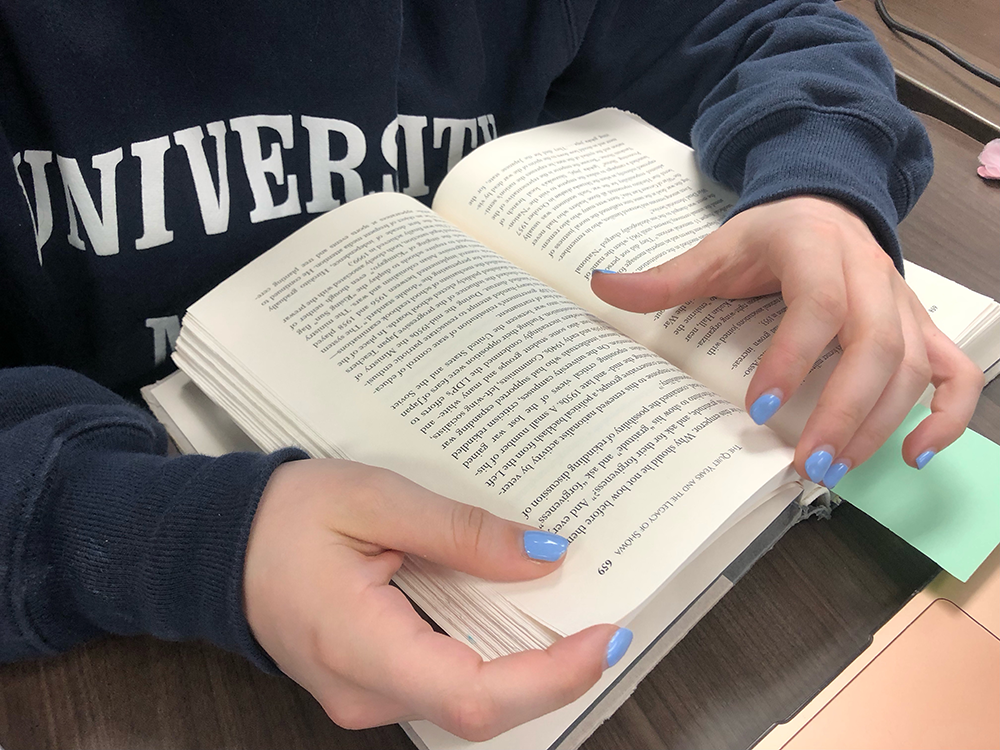Books are at the nexus of learning, no matter the course of study. For some, they are instructional textbooks filled to the brim with facts, technical references and statistics. For others, they are carefully crafted philosophical treatises espousing fundamental truths of our reality.
As many students have noticed, how we access and interact with our books is changing. This semester, University of Maine students saw various classes introduce a new program that moves our course textbooks onto our screens. This program is called “Inclusive Access”.
The classes offering “Inclusive Access” started with every student instantly opting into the program upon enrollment, automatically charging the price of the course books to their student account. This allows those students to access their books via a digital library on the first day of class.
An anonymous UMaine official argued that this new program “ensures both affordability and accessibility on the first day of class.” Touting the benefits of this program, that official said that “students do not have to search for material, they don’t have to remember to purchase their materials, and they don’t have to worry about out of stock situations.” Adding to that, the official claimed that textbooks purchased through this new program are usually half the price of the physical copy.
Further, the official reported that the opt-out rate for the program this semester has been under 5%, which they have taken to mean that the program is successful and that “students are satisfied with the results.”
However, this new program might not be as beneficial for the students as UMaine claims. Robert Ballingall, a professor of political science at UMaine, strongly believes that “Inclusive Access” will harm student’s ability to comprehend their reading.
“Based on everything I’ve learned as an instructor and everything I’ve read about pedagogy, ‘inclusive access’ is not good for students. The evidence of which I’m aware overwhelmingly supports course design that limits the distractions presented by internet-enabled devices. Students learn best when they are able to focus on their reading assignments and in-class discussions, goals best supported by ensuring affordable access to paper copies of assigned texts,” said Ballingall.
It is not hard to find the evidence that Ballingall is referencing. Several studies published in the “Education Research Review and the Journal of Experimental Education” suggest that reading via a digital medium causes comprehension to suffer. One of the studies had 90 undergraduate students read both digital and print versions of newspaper articles and book excerpts on childhood ailments and found that students “recalled key points linked to the main idea and other relevant information better when engaged with print.”
Further, another professor of political science, Robert Glover, said that he found the implementation of Inclusive Access confusing. He explained how the university administration contacted him and offered “Inclusive Access” for the students enrolled in his courses. Professor Glover accepted the offer but said that they did not adequately explain to him that the program would immediately opt-in all the students for that course by default without the consent of those students.
Exacerbating the consequences of this confusion and lack of communication, many students were not even aware of the existence of this program until classes started and were surprised to see that the bookstore was no longer selling paper copies on hand. It is no wonder that less than 5% of students did not opt out because if they wanted paper copies, they would have had to wait for more than a week after their classes began for their texts to arrive.
Despite the initial confusion and the contradictory evidence, UMaine will continue to move forward with pressuring instructors to implement “Inclusive Access” in their courses.
Ballingall, however, has plans to resist this effort by asking students to purchase paper texts directly from academic publishers, who may provide discount codes to professors who design courses that implement their texts. Moreover, he shared some final thoughts on the program itself, suggesting that it is sacrificing the quality of student learning for the university’s bottom line.
“I understand that academic publishers, university bookstores, and students themselves all face financial pressures that make ‘inclusive access’ seem attractive. But, in light of the pedagogical downsides of these policies, universities should not be striking a bargain with publishers to improve their bottom lines while compromising student learning. If the goal really is to improve student access to course texts, universities should better subsidize their bookstores to allow them to lower the purchase price of texts in paper copy,” said Ballingall.
It is important to remain sympathetic to the financial troubles of UMaine, and we must remain aware that cuts are inevitable. However, we must think very carefully about decisions that affect the quality of our learning. We promote ourselves as being an institution of learning. Still, if we don’t revere and respect something as central to the process of intellectual development as books, then nothing can remain sacred to the ax of cutbacks.




